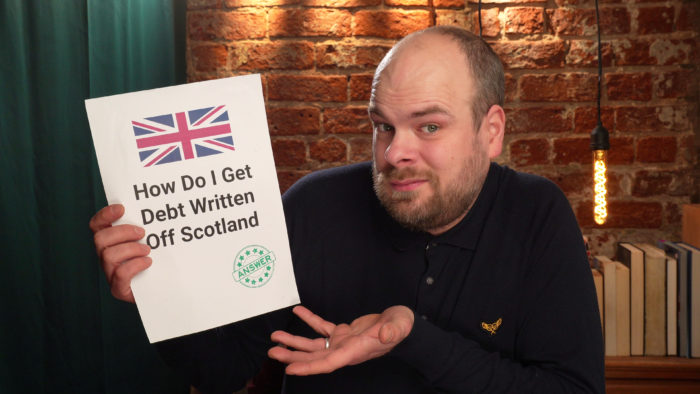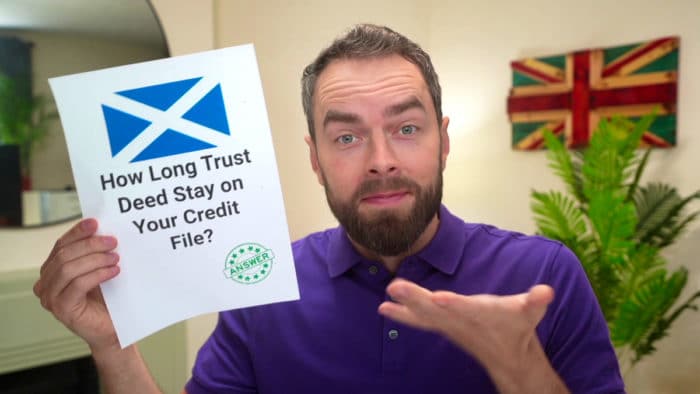How Do I Get Debt Written Off Scotland
For free & impartial money advice you can visit MoneyHelper. We work with The Debt Advice Service who provide information about your options. This isn’t a full fact-find, some debt solutions may not be suitable in all circumstances, ongoing fees might apply & your credit rating may be affected.

For free & impartial money advice you can visit MoneyHelper. We work with The Debt Advice Service who provide information about your options. This isn’t a full fact-find, some debt solutions may not be suitable in all circumstances, ongoing fees might apply & your credit rating may be affected.
Are you wondering how you can get debt written off in Scotland but aren’t sure where to start or what the requirements are? You’re not alone! Every month, thousands of people visit our website looking for guidance on debt solutions.
In this article, we’ll explain:
- How you can apply to have some debt written off.
- What are the options available to you.
- What a Debt Arrangement Scheme is.
- What a Trust Deed is.
- What Sequestration is.
- What a Minimal Assets Process entails.
Our team understands what you’re going through, as many of us have been in similar situations, dealing with debt and trying to write it off. This is why we know exactly what to do to help you figure things out. Let’s dive in and discover how you can write some of your debt off!
How do I apply to have my debt written off?
Use this write-off-your-debt template to make your request to have your debt written off. Keep copies of all correspondence to and from your creditor.
You could need this written evidence at a later date if another company buys the debt and attempts to chase you for payment.
You should also check to see if the debt is Statute Barred.
What if my request to have my debt written off is declined?
If your request to have your debt written off is declined, you could offer a partial amount and see if they are willing to write off the rest.
If they still refuse then you have the right to ask them why. If the creditor is a registered firm with the Lending Standards Board they are strongly encouraged to provide reasons for their refusal.
If they do this and you can provide additional information to dispute their reasons then you should, they then may look at your situation again.
What other options are available to me?
Other options are available to you should your request be denied.
- A Debt Arrangement Scheme (DAS)
- A Trust Deed
- Sequestration
- Minimal Assets Process
What is a Debt Arrangement Scheme?
A Debt Arrangement Scheme, or DAS, is a government-backed initiative designed to provide financial relief to individuals struggling with debt. The program enables participants to negotiate with their creditors and arrange manageable payments over an agreed-upon time period.
Any interest that accrues on the existing debt is frozen and fees are waived upon completion of the payment plan.
Debt Arrangement Schemes (DAS) are designed for people who have a regular income, and can afford to pay their debts but feel overwhelmed by the pressure of mounting debt.
If you have some disposable income after paying your living expenses and want to pay off your debts without the hassle of creditors, a DAS might be right for you.
Once all the terms of a DPP have been agreed upon in principle, then the debtor is obligated to pay a single amount as a lump sum payment each month.
This payment is determined with the use of the Common Financial Tool, which follows government-established protocols to make sure that payments are both affordable and realistic for debtors.
Payments can be made through any regular debit or credit card, or through setting up regular automatic payments with your bank.
How a debt solution could help
Some debt solutions can:
- Stop nasty calls from creditors
- Freeze interest and charges
- Reduce your monthly payments
A few debt solutions can even result in writing off some of your debt.
Here’s an example:
Situation
| Monthly income | £2,504 |
| Monthly expenses | £2,345 |
| Total debt | £32,049 |
Monthly debt repayments
| Before | £587 |
| After | £158 |
£429 reduction in monthly payments
If you want to learn what debt solutions are available to you, click the button below to get started.
What is a Trust Deed?
A Trust Deed is a voluntary agreement between you and your creditors which allows you to pay back a fixed amount of money over a certain period of time, after which the remaining debt will be written off.
All your assets will be passed on to a trustee who will handle the financial affairs. The trustee’s responsibility is to pay as much of the debt due as possible, which may involve selling some of your property or belongings in order to raise money for creditors.
A Trust Deed can be a protected trust, which means that the majority of the creditors are in agreement and they will not be able to take any further action in regards to your debt.
A trust deed that is not protected means that your creditors, if they wish, can take action at any time.
What are the criteria for applying for a Trust Deed?
To be considered for a Trust Deed you must have enough money to be able to make payments each month, owe more than £5000 and have assets that could be sold, such as a car, or your own home.
If your only income is from benefits then you will not be able to set up a Trust Deed but the Minimal Assets Process might be an alternative option.
What is Sequestration?
Sequestration is a legal process by which an individual can be declared insolvent (bankrupt). Insolvent means that you have no sufficient funds to pay off your debts when they are due.
When it seems impossible to repay your debts and all other options have failed, you may consider bankruptcy as a solution.
Bankruptcy may be the best way to handle the difficult financial situation when reaching an agreement with your creditors becomes infeasible. It can also provide great relief from the overwhelming debt pressure caused.
Thousands have already tackled their debt
Every day our partners, The Debt Advice Service, help people find out whether they can lower their repayments and finally tackle or write off some of their debt.

Natasha
I’d recommend this firm to anyone struggling with debt – my mind has been put to rest, all is getting sorted.
Reviews shown are for The Debt Advice Service.
What are the advantages and disadvantages of sequestration?
| Advantages | Disadvantages |
| You can be debt free in as little as 6 months | Your credit rating will be affected for 6 years which will prevent you from obtaining further credit in that time. |
| You will not have to deal with your creditors or be chased for payments. | You may lose your home and other possessions to pay your debt. |
| Your unsecured debts will be written off, although it is possible that you may have to make a contribution. | Depending on the type of work that you do, it could be affected. |
What is a Minimal Assets Process?
The Minimal Asset Process (MAP) is an option for those facing severe debt who have little to no disposable income or whose only source of income is from benefits.
If you have a low income and no substantial assets, then a MAP Sequestration could provide a route to write off your unsecured debts in a shorter period of time.
What are the criteria for a Minimal Assets Process?
To be eligible for the Minimal Assets Process you must meet the following criteria.
- Must be a resident of Scotland, or have been for the last year.
- Have a low income, for example, be on benefits or have nothing left over after paying your essential living expenses.
- Have debts between £1500 and £25000.
- If you own a car it must be worth less than £3000.
- You don’t own any single asset that is worth more than £1000 and total assets not worth more than £2000.
- You do not own your own home or land.
- You have not been bankrupt in the last 5 years.
How do I go bankrupt?
If you find yourself in a financial situation where bankruptcy is the best option to deal with your debts, you can apply for a moratorium on the diligence with the AiB. This will stop most types of court action by creditors for six weeks.
Accountant in Bankruptcy (AiB) is an Executive Agency of the Scottish Government they are responsible for administering the process of personal bankruptcy and recording corporate insolvencies in Scotland.
The fee for this is £150 unless you receive certain benefits such as Universal Credit, Child Tax Credits or State Pension Credit.
For those receiving other forms of income-related benefits may also qualify for this fee exemption. If needed, payment can be made in instalments.
When submitting an application for bankruptcy, it is important to ensure that all forms are completed accurately and thoroughly, including any necessary supporting evidence. This will give you the best chance of a successful outcome.
The trustee, who is responsible for administering your bankruptcy, will either be the AiB or a separate insolvency practitioner depending on your particular circumstances.
If there are any assets to be sold in order to pay off creditors, the trustee will be responsible for making this decision.
Once a trustee is appointed in your bankruptcy case, they will manage your financial affairs until the end of your bankruptcy term.
The term ends when all of your assets have been disposed of and you are discharged from your debts. A discharge releases you from any further liability for all debts covered by the original bankruptcy filing.


